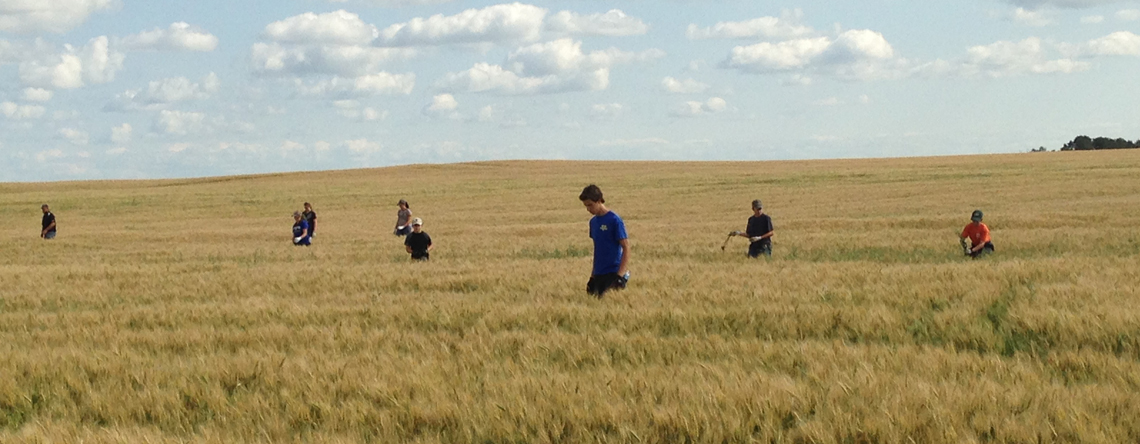CAAR and the CSGA offer a lesson on the importance of certified seed.
The world of certified seed and the agri-retail industry intersect in one important area: an interest in making the best quality products available to Canadian producers. In the spirit of collaboration, CAAR has teamed up with the Canadian Seed Growers Association (CSGA) to offer the eLearning course Investing in Certified Seed.
The course, available at caar.org, was developed to provide agri-retailers with the knowledge they need to confidently sell certified seed to their customers. Those who complete the program will walk away with an understanding of how certified seed is produced, how the quality is managed and risks reduced, and the important role it plays in bringing crop innovation and opportunities to Canadian agriculture.
Brent Lowes, sales rep for Hetland Seeds, knows the value of certified seed and how much it can improve a retailer’s offering to their customers. “It’s a win-win situation,” he says. “The farmer is getting (the seed quality) they paid for, and agri-retailers are selling a high-end product – bringing more people through the door and in turn making business more profitable.”
Sowing Quality and Trust
For seed to be certified, it has to have passed field inspection for certain weeds, other seed varieties and any seed-borne diseases. This guarantee that starts with the seed benefits every step of the value chain, offering assurance that a retailer is providing the best product to their customer, who can then produce and sell the highest quality crop.
Producers who choose certified seed will start their crop with assurances of purity, identity, pedigree and traceability – this gives them more confidence in the planting stage, and results in less dockage at delivery. The tangible return on investment of certified seed is apparent when compared to bin-run or common product.
Partners in Education
Producers often look to their agri-retailer for advice when planning their growing season, including seeding choice.
“As agri-retailers, we are the first contact with the producer and our farmers trust us with their business decisions,” says Lowes. “As seed technology is constantly and quickly evolving, staying up to date on the latest innovations can help a retailer alleviate confusion for their customers when buying and using certified seed.”
To ensure agri-retailers have access to the information they need to add value to their customers’ decisions, CAAR teamed with the CSGA to make this program available to their memberships.
“CAAR’s extensive training library, and commitment to support the further education of our members, made it a natural fit to include the Investing in Certified Seed program in our syllabus,” says Lynda Nicol, CAAR’s communication and member services manager.
“By getting a full understanding of the quality assurance, innovation, traceability, and return on investment Canadian farmers receive when they purchase certified seed, agri-retailers will be in a better position to both understand it as a product, and recommend it to their grower customers,” she says.
The Investing in Certified Seed eLearning course is available now in the Training section on caar.org. The cost is $10 for CAAR and CSGA members, and $15 for non-members. Certified Crop Advisors are eligible to receive 0.5 CEU credits upon successful completion of the course.
Click here to take the course today.
What Defines Certified Seed?
- Varietal Purity
At each stage of pedigreed seed production, standards for isolation distances, land-use history, maximum levels of off-types, other crop kinds and weeds have been established by the CSGA. These are the rules all seed growers must follow to maintain crop purity. Seed growers must plan years in advance what crop they will plant, and where, to prevent contamination. - Germination
Just like the pedigree of a prized animal, the pedigree of a seed crop is documented on paper from the breeding establishment to commercial sale. Documented seed lab test results from seed labs accredited by the Canadian Food Inspection Agency (CFIA) also confirm seed purity and germination of all certified seed crops. - Freedom from Impurities
In the field, third-party inspections overseen by the CFIA verifies proper isolation, that the crop was produced from a higher level progeny, and absence of volunteer crops and off-types. In pedigreed seed processing plants, registered by the CFIA, random sampling verifies mechanical purity which is the freedom from weeds and other crop kinds.
Source: Seedgrowers.ca
Related Articles
- Gathering Retailer Members’ Input Canadian Association of Agri-Retailers (CAAR) has extended its Retailer Member Survey to Jan. 15, 2021, giving members additional time to express their opinions on how CAAR can improve the services it offers and iden...
- Reaching Out to Retailers In October 2020, the Canadian Association of Agri-Retailers (CAAR) launched an online member survey tailored exclusively to the retail members of the association. Click here to complete the survey and provide your in...
- Working Together to Keep it Clean Keep it Clean, a joint initiative of the Canola Council of Canada, Pulse Canada, Cereals Canada, the Barley Council of Canada and the Prairie Oat Growers Association, has developed a new advisor toolkit for Canadian ...
- Evolution in Canadian Fertilizer CAAR was proud to represent retailers during three days of meetings on the future of registration, regulation and use of fertilizer products in Canada. Retail Industry Takes a Seat at the Discussion Table CAAR wa...
- Taking the Lead with NH3 CAAR has helped members weather regulatory changes for 25 years. When the members of the Western Fertilizer and Chemical Dealers Association (WFCDA) voted to form a national organization, they sought to achieve more...
 How to resolve AdBlock issue?
How to resolve AdBlock issue? 
Join the discussion...
You must be logged in as a CAAR member to comment.
Report
My comments